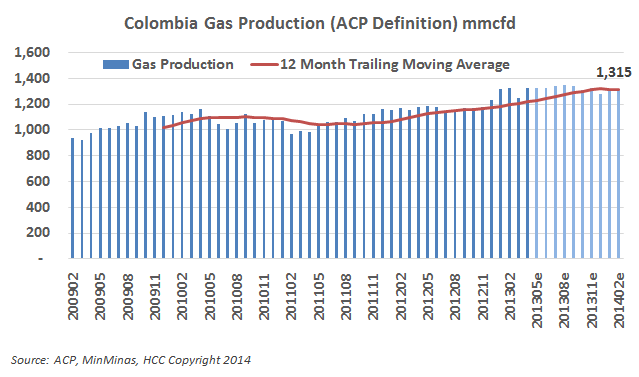The Colombian Petroleum Association (ACP) has been coordinating an effort to get expert opinion on the causes of the drought affecting Paz de Ariporo, and that its roots are not firmly in the oil industry. But a persistent community movement continues to finger oil.
The final stretch of the Colombia’s great oil infrastructure: The Bicentennial Pipeline passes through Caño Limon, which is fraught with problems. Guerrillas attack it, while an indigenous community will not let crews in to repair it. The end result is missed shipments, 35,000bd of lost production worth millions a day and jobs for the local community. Who will right this situation?

GasThe Colombian Association of Natural Gas (Naturgas) says 2013 was a positive year for the natural gas industry and that its use continues to grow, and it now has a 24.4% share of primary energy production, and that if methane gas associated with coal can be harnessed, reserves could triple over the next five years.
A meeting in Yopal that included all the big institutions from the national government for a roads project in Casanare yielded an offer of support from the national government, but the local authorities say it pales in comparison to the costs of keeping heavy trucks on the road.
Citing the risk that social programs could be affected until royalty reforms, the central government has issued a decree to pay more than US$176M to producing regions, in what appears to be most relevant change to the new royalty system since its enactment.
Frequent attacks on the Caño Limon and Bicentennial Pipeline have claimed another causality: 500 jobs with Occidental de Colombia (Oxy), who has cut the positions as their pumping station in Arauca has been unable to keep up optimum crude levels for a month due to attacks from the ELN guerrilla, while another report says partner Ecopetrol (NYSE:EC) has declared force majeure on shipments for the same reason.
Ecopetrol’s (NYSE:EC) transport and logistics spinoff Cenit has celebrated its first year of operations, and hailed the completion of the Bicentennial Pipeline as the highlight for this first year.
The Minister of Environment and Sustainable Development (MinAmbiente) Luz Helena Sarmiento is planning to present a legislative bill and new decree to “align environmental legislation to the needs required for climate control prevention”, which will likely include restrictions on seismic exploration.
The USO says the recent firing of the president of its Cartagena chapter –the arm of the union wrapped up in an extended conflict at the Cartagena Refinery (Reficar)- constitutes a new strategy “to exterminate” the union.
Incidents near areas of interest to the oil and gas industry were up to 40, above recent and long-term averages. Non-Armed-Forces-reported incidents were below average both in percentage and absolute terms. This is our indicator of increased guerrilla-initiated activity. Our 4-week Moving Average incident count was down at 39.7 and the 52 week average was up slightly at 31.2 incidents per week.